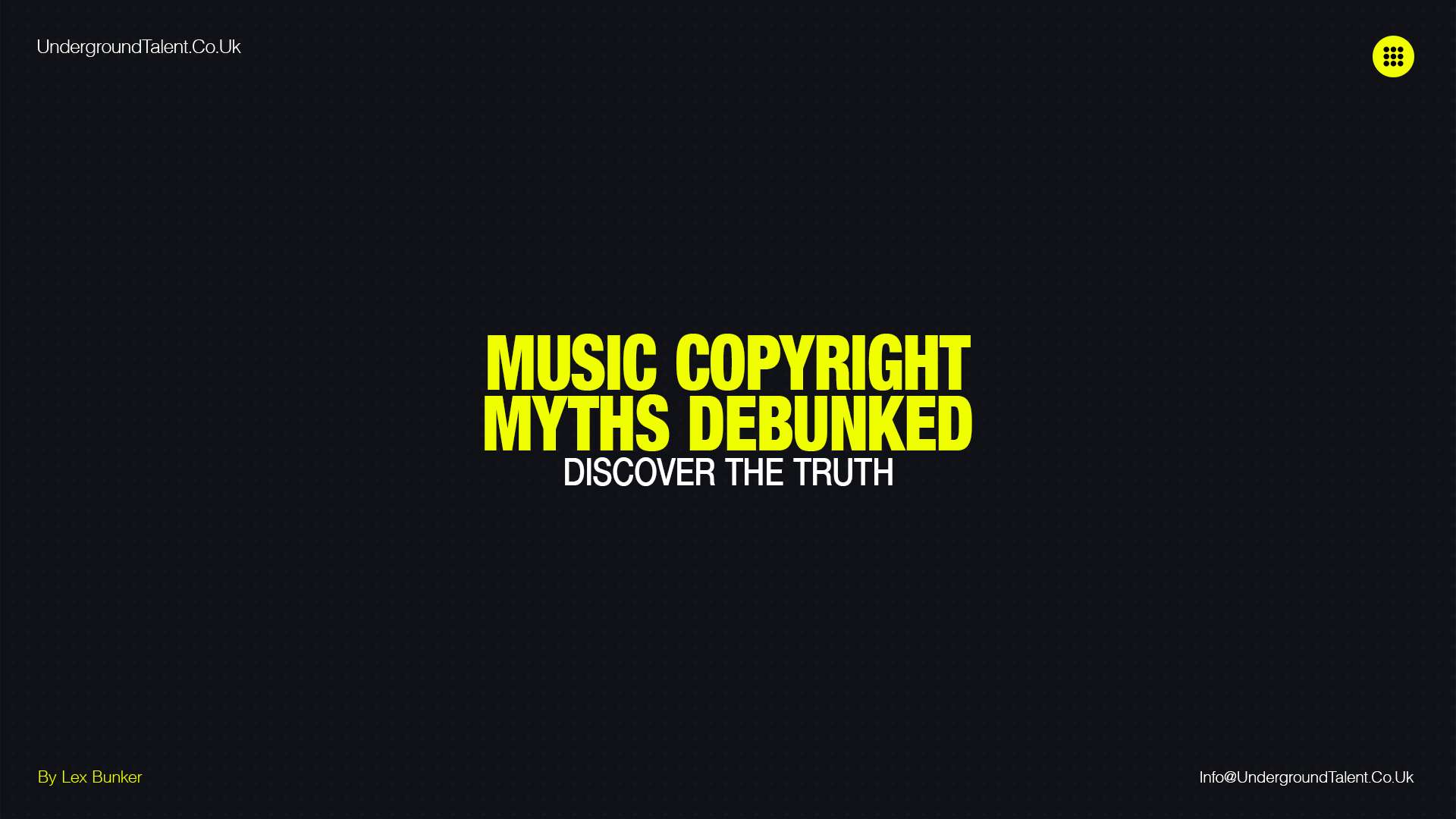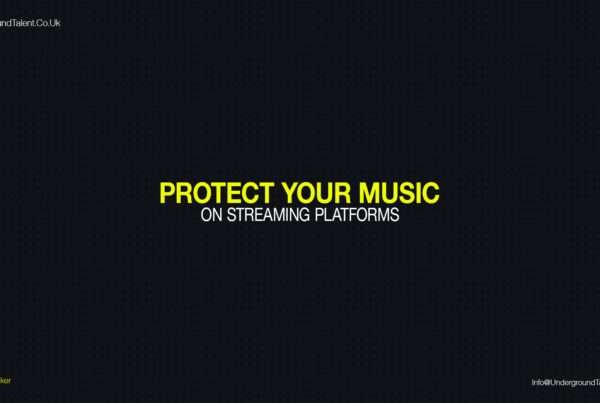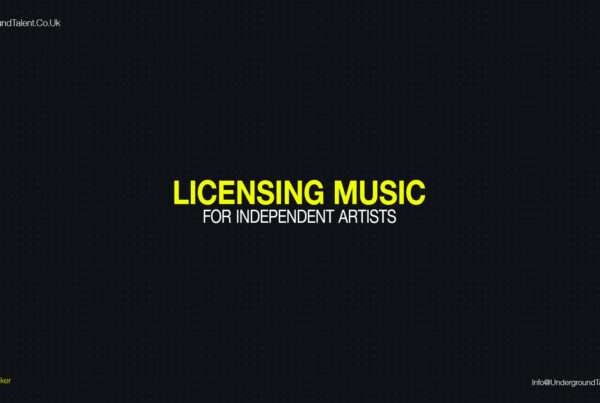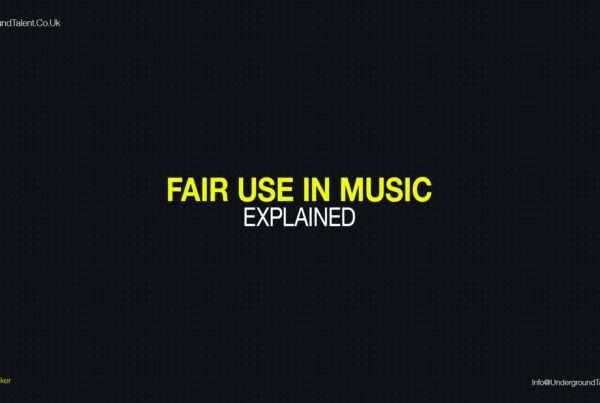Introduction to Music Copyright Myths
Understanding music copyright is crucial for every artist and content creator. Many people believe common myths about music copyright, which can lead to costly mistakes. This article aims to debunk these myths and provide clarity.
You’ll learn the truth about music copyright and how to protect your work.
Whether you’re a musician, producer, or just curious, this guide will help you navigate the complex world of music copyright. Say goodbye to confusion and hello to peace of mind.
Let’s dive in and uncover the facts, ensuring you know how to avoid pitfalls and safeguard your creativity.
Understanding Music Copyright: The Basics
What is Music Copyright?
Music copyright is essential for protecting your creations. It gives you exclusive rights to your music. This includes reproduction, distribution, and public performance. Without copyright, anyone can use your music without permission. Protect your work and control how it’s used. Additionally, copyright can enhance your professional reputation, showing that you take your art seriously.
For a detailed guide on how to copyright your music, check out this article.
How Does Music Copyright Work?
Music copyright applies automatically when you create and record a song. You don’t need to register it, but registration provides extra legal protection. Copyright ensures no one can use your music without your consent. It covers everything from recordings to sheet music. This automatic protection makes it easy for musicians to secure their work from the start, providing peace of mind.
The Benefits of Having Your Music Copyrighted
Copyrighting your music protects your rights and potential earnings.
It prevents unauthorized use and lets you take legal action if needed. Copyright ensures you benefit financially from your work. It gives you control over how others use your music.
Proper copyright can protect your music globally.
Additionally, it can open doors for licensing deals, collaborations, and other opportunities, enhancing your career prospects.
7 Music Copyright Myths Debunked: Uncover the Truth
Music Copyright Myth #2: “Using a Small Clip of a Song Is Always Okay”
Many believe using a small clip of a song falls under “Fair Use.” However, this is not always true. Fair Use has specific limitations and doesn’t automatically apply to all short clips. Understanding these limitations is crucial to avoid legal issues.
One common misconception is that any clip under a certain length is safe to use. This is false. The purpose, nature, amount, and effect of the use are all factors in determining Fair Use. Simply using a short clip does not guarantee protection under Fair Use.
To use small clips of music legally, always seek permission from the copyright holder. Alternatively, use music that is licensed for such purposes or is in the public domain. Platforms offering royalty-free music are also a good option. Ensuring proper usage helps you avoid legal repercussions and supports the artists who created the music.
Music Copyright Myth #3: “Giving Credit Means You Can Use Any Music”
Many people think that giving credit to an artist allows them to use the music. However, there’s a big difference between giving credit and obtaining permission. Simply attributing the creator does not grant you the legal right to use their work.
Attribution alone is not enough because copyright law requires explicit permission from the copyright holder. Even if you give full credit, you are still infringing on the artist’s rights without proper authorization. This misunderstanding can lead to serious legal consequences.
To legally obtain music licenses, you need to contact the copyright holder or their representative. Often, this involves paying a fee for the right to use the music. You can also use licensing platforms that offer a range of music for specific uses. This ensures you respect copyright laws and fairly compensate the creators for their work.
Music Copyright Myth #4: “Old Music Is Automatically in the Public Domain”
Many believe that all old music is automatically in the public domain. This is not true. The criteria for music entering the public domain vary and depend on factors like publication date and jurisdiction.
In the United States, for example, music published before 1924 is generally in the public domain. However, music published after this date may still be under copyright protection. This means that even if a song seems old, it might not be free to use without permission.
Examples of old music that is still copyrighted include many songs from the mid-20th century. Works by artists like The Beatles and Elvis Presley, though decades old, are still protected by copyright laws and require permission for use.
To check if a song is in the public domain, you can consult resources like the U.S. Copyright Office, online public domain databases, or legal experts. Always verify the copyright status before using any music to ensure you’re complying with the law.
Music Copyright Myth #5: “If You Change the Music, It’s No Longer Copyrighted”
Many people believe that changing music means it’s no longer copyrighted. This is incorrect. The concept of derivative works covers this area. A derivative work is a new creation based on an existing copyrighted work, such as a remix, cover, or adaptation.
Legally, remixing or altering copyrighted music still requires permission from the original copyright holder. Even if you make significant changes, the original creator retains rights to their work. Unauthorized alterations can lead to legal trouble, including lawsuits and fines.
The amount of change needed for a new copyright is substantial. Simply modifying a melody or adding new elements does not create a new copyright. The original work’s essence must be transformed significantly. Even then, the original work’s copyright holder may still have claims.
To avoid issues, always seek permission before altering copyrighted music. This ensures you respect the original creator’s rights and stay within legal boundaries.
Music Copyright Myth #6: “As Long as You Don’t Make Money, You Can Use Any Music”
Many believe that using music without profit is always legal. This myth confuses commercial and non-commercial use. Commercial use involves profit-making activities, while non-commercial use is not for profit.
Non-commercial use can still violate copyright laws. Copyright protects the creator’s rights regardless of profit. Using music without permission, even for non-commercial purposes, is illegal. The creator’s rights are infringed, and they can take legal action.
There are examples of non-commercial use leading to legal issues. For instance, using a popular song in a YouTube video without monetization can result in takedown notices or lawsuits. Schools and non-profits using music without licenses have faced similar legal challenges.
Always obtain permission or use licensed music, regardless of your intent to make money. This ensures you comply with copyright laws and respect the rights of creators.
Music Copyright Myth #7: “Royalty-Free Music Means It’s Free to Use”
Many people think that royalty-free music is free to use. However, “royalty-free” does not mean “no cost.” It means you pay a one-time fee to use the music without recurring royalties.
Royalty-free music still has licensing requirements. You must adhere to the terms set by the license. This includes how and where you can use the music. Failing to comply with these terms can result in legal issues.
To find legitimate royalty-free music, use reputable sources. Websites like AudioJungle, PremiumBeat, and Epidemic Sound offer a wide range of royalty-free tracks. Always read and understand the license agreement before using the music.
Using royalty-free music legally ensures you respect copyright laws and the work of creators. It provides you with high-quality music for your projects without the ongoing costs of traditional licensing.
How to Protect Yourself and Your Music
Steps to Legally Use Music in Your Projects
To legally use music in your projects, follow these steps:
- Obtain Permission: Contact the copyright holder for permission to use their music.
- Use Licensed Music: Purchase licenses from reputable sources that provide royalty-free or licensed music.
- Read Agreements: Understand the terms and conditions of any music license you acquire.
- Credit Properly: Always credit the artist if required by the license.
Tips for Musicians to Protect Their Copyrights
- Register Your Music: Officially register your music with the copyright office in your country for additional legal protection.
- Use Watermarks: Include watermarks in your music to discourage unauthorized use.
- Monitor Usage: Keep track of where and how your music is used.
- Join a Performance Rights Organization: Organizations like ASCAP, BMI, and PRS for Music can help manage your rights and collect royalties.
To learn more about performance rights and how to protect your work, read this article.
Resources for Learning More About Music Copyright
- U.S. Copyright Office: Provides comprehensive information and resources on copyright law.
- ASCAP and BMI Websites: Offer detailed guides on performance rights and royalties.
- Music Law Books: Invest in books about music law to deepen your understanding.
- Online Courses: Platforms like Coursera and Udemy offer courses on music copyright and law.
Conclusion to Music Copyright Myths
We’ve debunked several common music copyright myths: online music isn’t always free to use, short clips aren’t automatically fair use, giving credit isn’t the same as getting permission, old music isn’t always public domain, altering music doesn’t negate copyright, non-commercial use can still infringe on rights, and royalty-free music isn’t free.
Understanding music copyright is crucial for protecting your creative work and avoiding legal pitfalls. Knowledge empowers you to use music responsibly, ensuring that you respect the rights of others while safeguarding your own.
When in doubt, always seek legal advice. Copyright law can be complex, and a legal expert can help you navigate it. Protect your creativity and peace of mind by staying informed and compliant with copyright laws.
Additional Resources
- Best MIDI Keyboards for Electronic Music Production in 2024
- Best Speaker Isolation Pads for Home Studio
- Benefits of Using AI Music Generator for Content Creators
- Promote Your Music on TikTok: The Ultimate Guide
- Electronic Music Promotion – Unlock Massive Growth with Hypeddit
Producing Techno? Get Your Free Sample Packs.
Dive into electronic music production with our newly released “Free Techno Tools V1” and “Free Techno Tools V2” sample packs. These packs are full of high-quality sounds that will add a professional touch to your tracks. If you’re looking to expand your sound library, these free sample packs are perfect for every techno fanatic. Click on the links below to access these fantastic resources and elevate your production game today!
Connect With Us.
Join our vibrant community for more wisdom and updates:
And Always Remember…
Have Fun & Be Creative!





